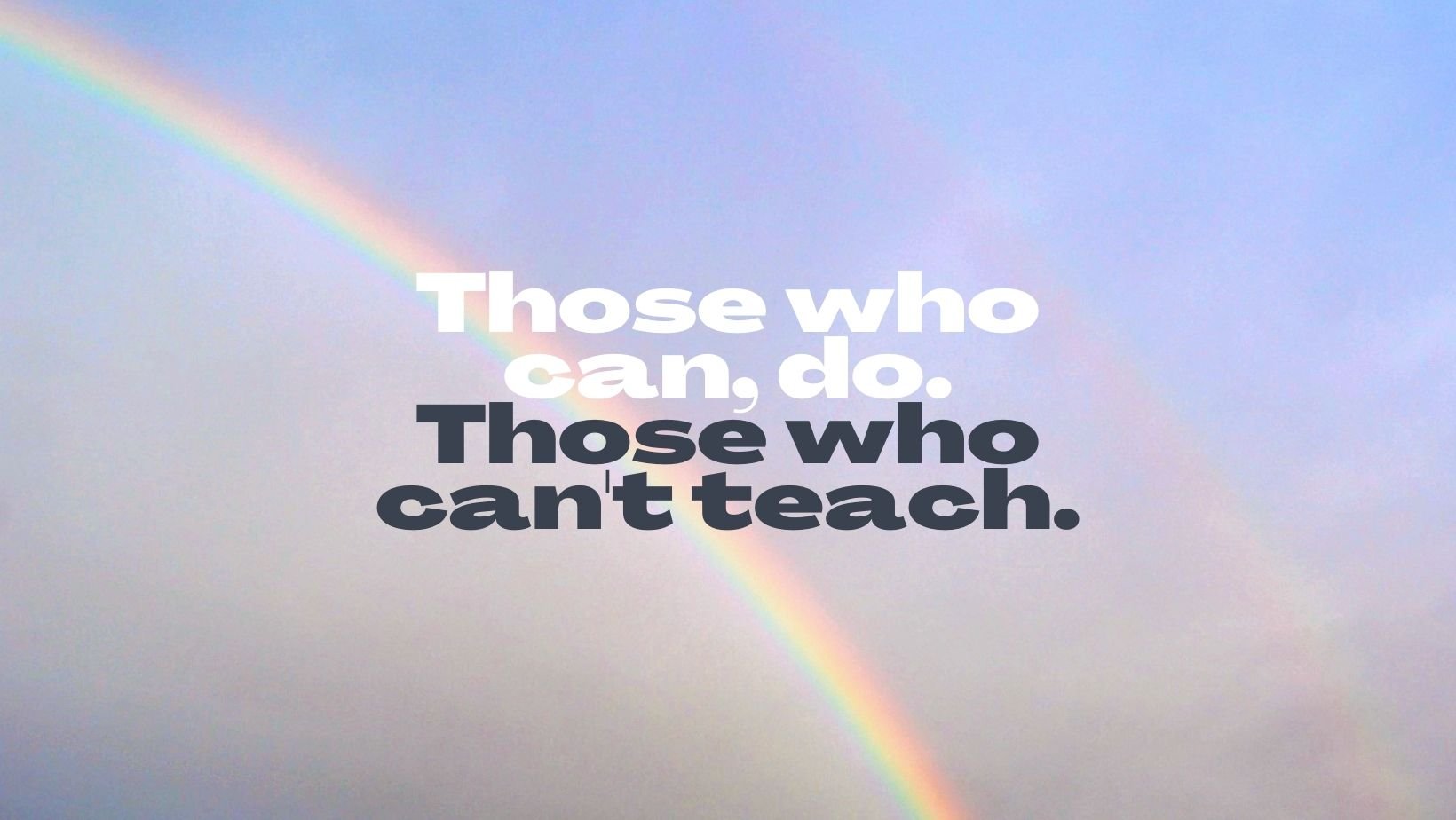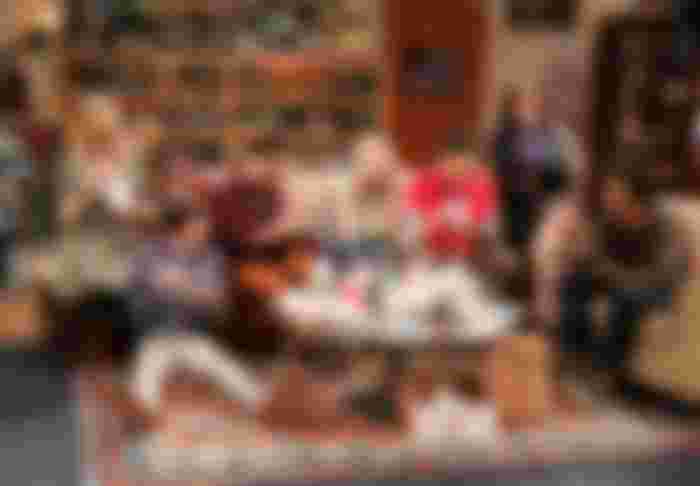"Those Who Can, Do. Those Who Can't, Teach."

Those who can, do. Those who can't do, teach.
I am now in the third year of my college education but recall how I first encountered this quote. This was when I told my seatmate in ninth grade that I wanted to become a teacher. That I wanted to take education as my program in college. He was so bewildered and he asked me, "Why?" as if it was such an extreme decision to make.
He told me "Those who can, do. Those who can't do, teach. I can't help but think that this was such an unfair thing to say, but I just didn't know why exactly. And it didn't help that the teacher that was supposed to be in class in that period had been absent for the entirety of third quarter, leaving us students to read Noli me Tangere by ourselves.
Every year, I had at least one bad teacher. I experienced the frustration of hearing my instructor struggle with simple subject-verb agreement in leading us to prayer. Some teachers would even go as far as picking fights with the students. They use their power to drive a student into a comer and bully him into respecting them.
I wanted to be proud of where I studied, a private catholic school. But when my parents asked, "Anak, teacher mo yan?" I just can't help but cringe, yes, that's my teacher. And my father would always tell me, "Well at least you know what you shouldn't do when you finally teach, yourself!"
But what if those who just can't do, teach?
What if those who can't properly apply what they have studied, just settle into teaching it? What if the reason why the educational system is sooo bad is that the actual successful people aren't the people that are teaching us? Does that mean that we are depending the state of our future with a bunch of washed-up, mediocre people?
During the first quarantine lockdown, I have downloaded and watched all 12 seasons of the award-winning show, the Big Bang theory.

SIDE NOTE: The casting is absolutely amazing. The script? The dialogue? Natural yet manages to keep all the scientific and comic facts straight. Because most of the main cast were all either scientists or big comic fans, that was a vital thing to not mess up. To say that I loved this show is an understatement. I was obsessed.
However, I recall in season 5 episode ten, there was a bit where Sheldon suggests Leonard consider changing his discipline into the humanities or history. He adds that one of the perks of teaching history is he does not have to create things; he just needs to memorize facts and parrot them back. (Watch that clip below:)
But then, in another episode, Sheldon was promoted to be junior professor, which required him to teach some classes. No one had attended his class, even though he was an absolutely notable icon in his profession. Spoiler alert, he even won a Nobel prize in the last episode. They said that everyone on the campus was aware of his capabilities and respected his capabilities and intellect.
But they also knew how Sheldon can be condescending and boring to listen to. Anyway, his friend, Howard, tried to console him by signing up for his class. Long story short, this setup didn't last very long because of Sheldon's notorious attitude of proving that he is more intelligent than anyone else. (Watch that clip below:)
Maybe we are forgetting the fact that teaching is also doing, in a way. Maybe, we are underestimating the mastery and skill of both efficient Instruction and content. To say that teachers are teachers simply because they can't apply their knowledge directly is a gross generalization in itself.
There is a big number of caring and smart teachers that changed the lives of an even bigger number of students. US former president Bill Clinton and Barack Obama, Oprah Winfrey, Bill Gates, Steve Jobs, Helen Keller, the list can go on and on. Educators shouldn't be robbed of the credit they deserve for simply not making a lot of money or producing concrete outputs.
If doing means having a job directly related to the field of expertise, then the better way to say it is teachers can do, but they choose to teach. It simply is a matter of opportunities that are taken, missed, or just never arrive, especially in a third-world country such as ours. It is obviously much more practical to have a stable job that never goes out of demand.
When I was in senior high school, I was given the opportunity to work as an intern in Manila Broadcasting Company, particularly under Easy Rock (radio station), and sometimes under love radio. I loved it so much! We made scripts of our own spiels, queued in songs that will play on the actual live radio, and were even featured multiple times on air.

We also played as actors on a radio commercial and got to work with a lot of DJ's and marketing people. The environment is professional yet comfortable for people to express their creativity and skill. Not to mention, the food there was cooked in-house or catered ( I believe?) and was delicious too. Since MBC is just behind Star City ( It wasn't burned down yet), we often sneaked inside.
But now, I took the step and pursued teaching English to high school students in the future, instead of applying to an AB program, Communication or Journalism, perhaps? Although I recognize that I am interested in continuing those lines of work; there is just too much to sacrifice.
The first reason is that I grew up in a middle-income family, and I cannot settle for choices that don't involve a plan B. Education opens up a lot of backup plans. Second, I just do not see myself in that (Media) line of work every day.
It is fun and glamorous, yet it seems to lack the things that I was looking for. Growth. Genuine human interaction. Demand for flexibility and adaptability in skills and talents.
Teachers aren't as dispensable as we think they are. It is the noblest profession for a reason. Nonetheless, we cannot rule out the fact that there really are bad teachers, perse. But much like there are bad engineers, bad nurses, bad politicians, bad lawyers, it is completely normal to have less proficient people for multiple reasons.
Teachers can teach because they can do. On the other hand, some people cannot teach, so they just do. Many people who do, try to teach, but end up teaching badly. Ever have a college professor who was brilliant in a subject but an absolute disaster as a teacher?
So, to those who are thinking to pursue Education as well, next time you read somewhere or someone tells you, "Those who can, do; those who can't, teach," take it with a grain of salt. Remember, it is easy to take this as an insult, so take it as a compliment. Few people do excellent in their work. However, fewer people are given the talent to communicate how to do work excellently.
It should be said that those who can't teach, do. It's hard to appreciate what teachers do, unless one tries to do it, even just a little. There is no sense in pitting one against another. We need both teachers and doers. Two sets of different people are gifted with different skills.



